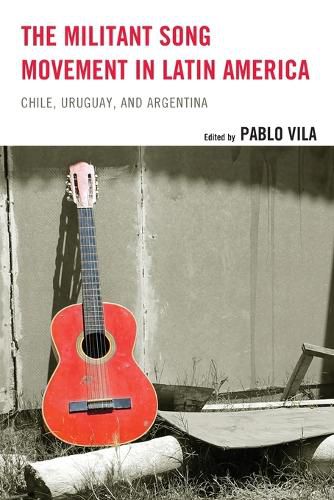Readings Newsletter
Become a Readings Member to make your shopping experience even easier.
Sign in or sign up for free!
You’re not far away from qualifying for FREE standard shipping within Australia
You’ve qualified for FREE standard shipping within Australia
The cart is loading…






Latin America in the 1960s and 1970s underwent a profound and often violent process of social change. From the Cuban Revolution to the massive guerrilla movements in Argentina, Uruguay, Peru, Colombia, and most of Central America, to the democratic socialist experiment of Allende in Chile, to the increased popularity of socialist-oriented parties in Uruguay, or para-socialist movements, such as the Juventud Peronista in Argentina, the idea of social change was in the air. Although this topic has been explored from a political and social point of view, there is an aspect that has remained fairly unexplored. The cultural-and especially musical-dimension of this movement, so vital in order to comprehend the extent of its emotional appeal, has not been fully documented. Without an account of how music was pervasively used in the construction of the emotional components that always accompany political action, any explanation of what occurred in Latin America during that period will be always partial. This book is an initial attempt to overcome this deficit.
In this collection of essays, we examine the history of the militant song movement in Chile, Uruguay, and Argentina at the peak of its popularity (from the mid-1960s to the coup d'etats in the mid-1970s), considering their different political stances and musical deportments. Throughout the book, the contribution of the most important musicians of the movement (Violeta Parra, Victor Jara, Patricio Manns, Quilapayun, Inti-Illimani, etc., in Chile; Daniel Viglietti, Alfredo Zitarrosa, Los Olimarenos, etc., in Uruguay; Atahualpa Yupanqui, Horacio Guarany, Mercedes Sosa, Marian Farias Gomez, Armando Tejada Gomez, Cesar Isella, Victor Heredia, Los Trovadores, etc., in Argentina) are highlighted; and some of the most important conceptual extended oeuvres of the period (called cantatas ) are analyzed (such as La Cantata Popular Santa Maria de Iquique in the Chilean case and Montoneros in the Argentine case). The contributors to the collection deal with the complex relationship that the aesthetic of the movement established between the political content of the lyrics and the musical and performative aspects of the most popular songs of the period.
$9.00 standard shipping within Australia
FREE standard shipping within Australia for orders over $100.00
Express & International shipping calculated at checkout
Latin America in the 1960s and 1970s underwent a profound and often violent process of social change. From the Cuban Revolution to the massive guerrilla movements in Argentina, Uruguay, Peru, Colombia, and most of Central America, to the democratic socialist experiment of Allende in Chile, to the increased popularity of socialist-oriented parties in Uruguay, or para-socialist movements, such as the Juventud Peronista in Argentina, the idea of social change was in the air. Although this topic has been explored from a political and social point of view, there is an aspect that has remained fairly unexplored. The cultural-and especially musical-dimension of this movement, so vital in order to comprehend the extent of its emotional appeal, has not been fully documented. Without an account of how music was pervasively used in the construction of the emotional components that always accompany political action, any explanation of what occurred in Latin America during that period will be always partial. This book is an initial attempt to overcome this deficit.
In this collection of essays, we examine the history of the militant song movement in Chile, Uruguay, and Argentina at the peak of its popularity (from the mid-1960s to the coup d'etats in the mid-1970s), considering their different political stances and musical deportments. Throughout the book, the contribution of the most important musicians of the movement (Violeta Parra, Victor Jara, Patricio Manns, Quilapayun, Inti-Illimani, etc., in Chile; Daniel Viglietti, Alfredo Zitarrosa, Los Olimarenos, etc., in Uruguay; Atahualpa Yupanqui, Horacio Guarany, Mercedes Sosa, Marian Farias Gomez, Armando Tejada Gomez, Cesar Isella, Victor Heredia, Los Trovadores, etc., in Argentina) are highlighted; and some of the most important conceptual extended oeuvres of the period (called cantatas ) are analyzed (such as La Cantata Popular Santa Maria de Iquique in the Chilean case and Montoneros in the Argentine case). The contributors to the collection deal with the complex relationship that the aesthetic of the movement established between the political content of the lyrics and the musical and performative aspects of the most popular songs of the period.